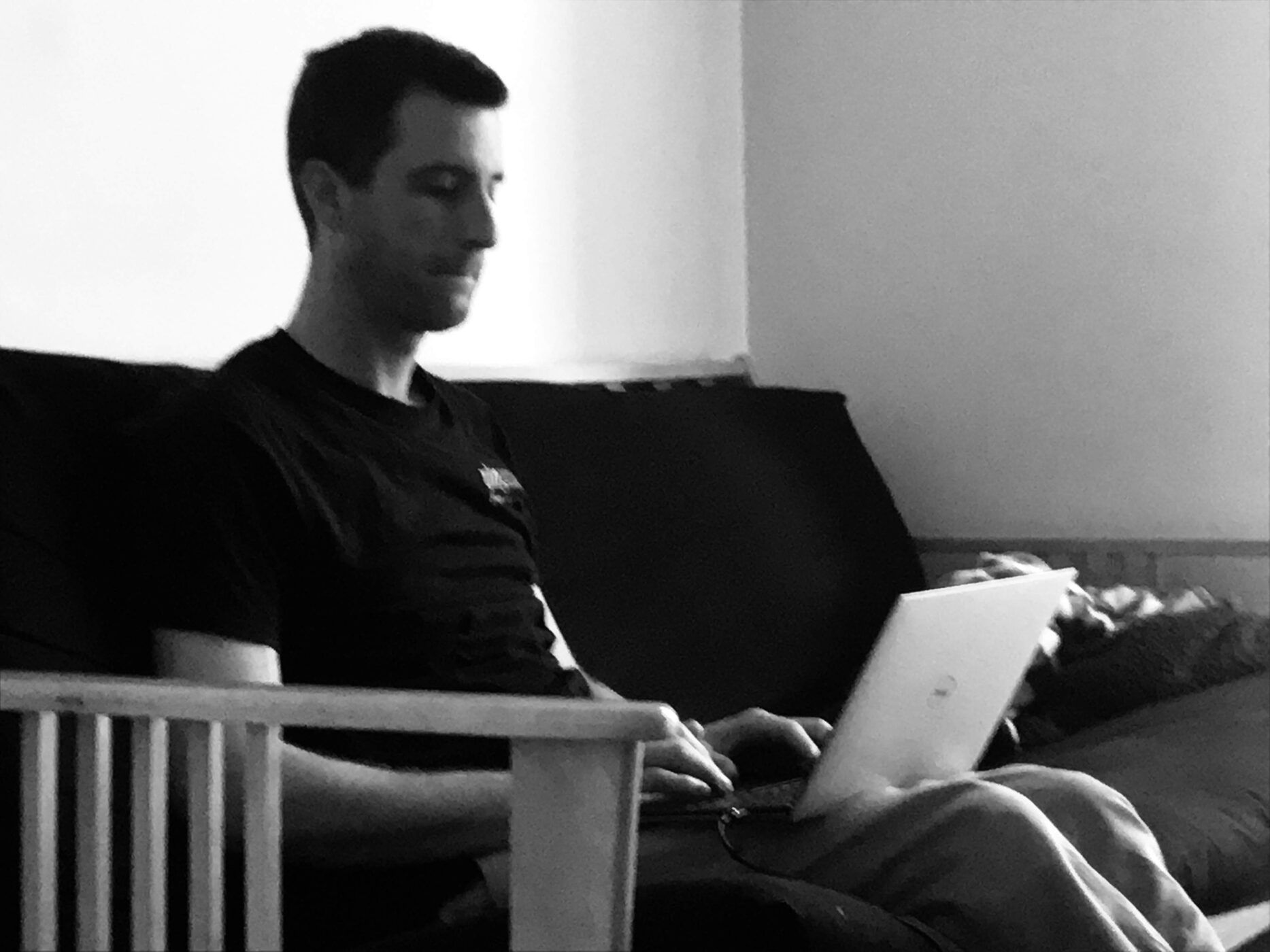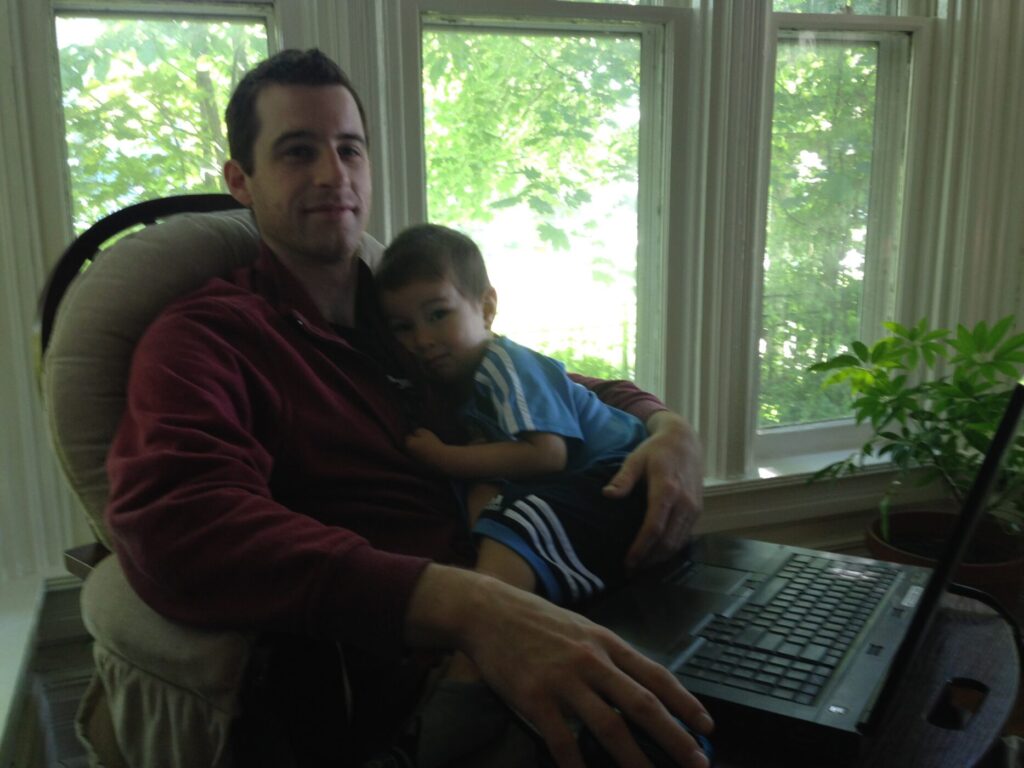One Last To-Do: Resign From My Job of 15 Years

Taking a family gap year required first quitting my job. After fifteen years building a unique career, the experience promised to be surreal. This is how it went…
The Big Announcement
I always knew that leaving the job I’ve held for fifteen years would be surreal. And when the time came to do it, the experience lived up to that expectation. Just not quite in the way I imagined.
When we booked our one-way plane tickets to Rio de Janeiro back in January, we cemented what had until then been nothing more than an aspiration that could be indefinitely put off. Now we were committed. And with that came the knowledge that at some date soon, I would have to announce my resignation.
So I rehearsed the Big Announcement in my mind on and endless loop.
At first, it was a breezy affair. I would walk in, announce my intention to leave. I would be met with disappointment, maybe incredulity. Some people wouldn’t understand. They would think I was throwing my life and career away. But I wouldn’t mind because, hey, I was living my life! Following my own compass.
I would try to make people understand how I saw life as relatively short, and my time with my kids as even shorter, and I was determined to make the best of this time. At the end of my life, would I seriously wish I had spent one more year as a software programmer?
But as I turned the scene over in my mind, with all the possible ways it could go, it began to fill me with anxiety.
Why I Began to Dread Quitting
First of all, this might sound strange, but I’ve never actually quit a job. I’m almost forty years old and have NEVER QUIT A JOB!!! Sure, I’ve had other jobs. And yes, I’ve stopped working at them. But going back to college at the beginning of term isn’t the same as “quitting”. So with no experience to draw on, the unknown filled me with trepidation.
Second, the plausible reactions from my boss ranged anywhere from disappointed but constructive (“sorry you feel you have to do this, but how can you help make this as painless as possible”) to vindictive (“get out of my office and don’t bother to collect any more paychecks, you traitor!”). I wasn’t expecting the worst, but it was a possibility. And that uncertainty of how people would react weighed on me.
And finally, my role at the company isn’t exactly normal. Let me explain.
Not Your Normal Career Path
This was my first and only job out of college. I started in 2007 as a civil engineer on a team that specialized in roadway resurfacing and reconstruction. The Great Recession at first dented, then demolished our backlog. The first layoff happened within weeks of my start date. After two years on the job, my entire department had completely disintegrated. Every member left or was laid off.
Except for me. I was the last man standing. And since I was still young and flexible (and my salary was only half that of the senior engineers), I got absorbed by another team that specialized in sanitary sewers. Fascinating, I know. Sanitary sewers are the ones that your poop travels through. And yes, I’ve been lowered into them like a tea bag on a string.
I quickly mastered this new specialty and just as quickly got bored with it. When not in the sewer, I was tasked with a lot of tedious sifting through Excel files filled with tens or even hundreds of thousands of data points. I would leave at the end of the day with my vision so blurred that I couldn’t see more than ten feet in front of me.
So I started teaching myself some programming to speed things up. At first, I spent three days just trying to execute a simple script that crawled through the data and found a row I was looking for. It seemed like a complete waste of time messing around with something I didn’t understand. Except for the fact that the task I was assigned was expected to take five days, and now I could complete it in minutes. So actually, as long as no one was looking over my shoulder and watching me fumble around with computer code, I looked incredibly productive.
Now, this isn’t that uncommon. Maybe you’ve written an Excel macro yourself. But I never stopped going deeper down that rabbit hole. Within I year I was writing a desktop application. In another year, I was reassigned from my group to essentially do nothing but program for the company. In another year almost the entire company used my application for most of their work. A couple years later, the entire company used it for all their work and never looked back.
But I didn’t stop there. I created a web application for our clients. I broke from the typical engineering app design conventions, with their sharp edges, neutral colors and over-complicated interfaces. I modeled it after the more mainstream and popular web apps with rounded corners, soft shadows, intuitive interfaces and liberal use of imagery. And it took off!
These days, when I walk around the office and scan the framed marketing posters adorning the conference rooms and hallways, quite often they are showing off something generated by software I designed, my artwork, my labor of love. My longish tenure and and unique career path have entered my name into company lore. I don’t mention this to toot my own horn. My intention is to to give you an honest sense of how my leaving might affect morale, and why I started feeling a sense of foreboding over letting people down.
Not only that, but over my fifteen years at the company I’ve accrued so many free articles of branded clothing that over half my wardrobe are emblazoned with the firm’s logo. My wife sometimes jokingly calls me “RJN” (the name of my company) as if the logo were an embroidered name tag. Would I have to start buying my own non-branded clothing once I left?

OK, So How’d the Quitting Go?
I know I’m keeping you in suspense. This was supposed to be about how low a boss’s jaw can physically drop when you announce you’re quitting after fifteen years. What crazy knee jerk response do you get when you rock your boss’s boat early on a Monday morning?
I’m getting to that. But I wanted you to understand why my expectations were shattered by the reaction I got. And to properly appreciate it requires ample backstory.
You need to understand how unexpected my departure was. How devastating some would imagine it be. How intertwined mine and the company’s identities have become over the years.
How would people feel when they found out I was secretly plotting an escape? Betrayed? How would the many people who rely on me for bug fixes, software features, business knowledge, pretty much any random question about the company — not to mention longstanding friendship — react when I announced I was not just leaving the company, but leaving the continent?!? Can hair spontaneously combust?
Working Up the Courage
On Monday, April 18th, 2022, I resolved that this was the day of the Big Announcement.
After Google searching “how to quit my job” (seriously, I didn’t know!) the main take-way was to avoid burning bridges. I already sort of intuited that, which is why I was giving two months notice. But it was a good reminder to stay on message in case the discussion got heated or awkward.
This could be the beginning of a miserable two months depending on how things went down. How were things going to go? What kind of conversation was I even preparing for?
Sitting at my desk, I checked my boss’s calendar. It said he was busy, but just two offices down from me, it didn’t sound like he was in a meeting.
I stood up. My heart immediately went into jack hammer mode so I sat back down. I reasoned that it would be better to have this conversation when the adrenaline wore off.
I was overthinking this. No, I had already crossed that line weeks ago. I had overthought this, and there was nothing more I could do to prepare.
Five minutes passed, and to my alarm, I realized my heart was never going to stop hammering my ribs until I either got it done or chickened out.
Screw it! I stood up and willed myself to walk. Silenzio Bruno!
Upon entering my boss’s office I closed the door. I recited the lead-in I had practiced hundreds of times in my mind, “I know this is probably the last thing you want to hear from me, but I’m going to resign.”
And Here’s How It Went
My supervisor’s face clouded over but he remained calm. “OK. Where are you going?” He assumed I was headed to another company, not another continent. He was girding himself for the what will it take to convince you to stay conversation.
“I’m going to spend a year with my family and travel South America,” I heard myself quaver. I felt like a big weirdo saying that. This was my quixotic fantasy. An aspiration that others in my life didn’t always understand or appreciate. I was laying out my pearls certain they would be trampled. This was the price of doing something highly unconventional.
To my surprise, he leaned back, the clouds parted and his expression brightened. “Well, I applaud you!”
“You what…”
“This is something you will remember for the rest of your life,” he continued. “Your kids are going to have so many memories. It was probably a risk for you to do this. But you’re doing something you love and prioritizing your family…” He related it to a sermon his pastor gave about leaving your comfort zone and taking risks.
It was the speech I was going to give if he cast doubt on my decision… but he was the one delivering it verbatim to me!
“So you’re not mad?” I pinched my arm hard in case this was some bizarre dream.
“I can’t get mad at that. I mean, yeah, if I were being selfish… we’re going to miss you being part of the team… but look, we’re all just working for retirement. Tell you what, I’m looking at this as a sabbatical. There will be a place for you when you get back.”
The Triumphant Exit I Didn’t Dare Hope For
Out of the thousand times I imagined this encounter, I had not once entertained the possibility that it might go perfectly fine. Did it seem too good to be true? If I had dared to imagine that all my coworkers, including my boss, would wish me well and send me off with kind words I would have flagellated myself for setting expectations too high.
All my coworkers, in fact, have expressed happiness for me, even as some mourn my impending absence (what about all those blocks of crappy code I wrote when I was sleep deprived that nobody will know how to fix?).
Another reason I couldn’t fathom an uncomplicatedly positive exit is a fear that lurks in my brain. It is the suspicion that my relationships depend solely on my contributions. That people only like or respect me as long as I am useful to them. And when I can’t or won’t continue, then what?
This notion, of course, is not true as evidenced most recently by the grace of my coworkers. But it is the fear that I’m just a small stumble away from disappointing (and losing) the people in my life that drives the best of me and the worst of me. It’s what makes it hard for me to relax and to get a good night’s sleep. It’s what makes criticism so hard to take. When you spend your life side-stepping a minefield of real and imagined potential criticisms, receiving negative feedback feels catastrophic.
On the other hand, it also compels me to prepare for every possibility, to try to strengthen my weak areas. It forces me to have patience with others when they fall short of expectations so that I am not confirming this fear in others. And it is a big part of what drove me be wicked good at the job I’m about to leave.
Even so, I’ve longed to break out of those anxiety inducing patterns of thought. Many achieve their freedom through failure. This life change, of course, is not a failure. But I am abdicating a role I’ve occupied for a large fraction of my life. It puts my identity, my relationships, and my place in society in question.
It is like shaking the Etch-a-Sketch that depicts the form of my life and career. The lines are fading and will soon be erased. But the skills I gained through “messing with things I didn’t understand”, the resilience I built working through thousands of technical support cases, and the sharp edges that hundreds of bad days sanded smooth are things that cannot be erased. They will remain with me wherever I go.
And soon I will set out with my blank Etch-a-Sketch and use my hard-won life experience to design something new.








